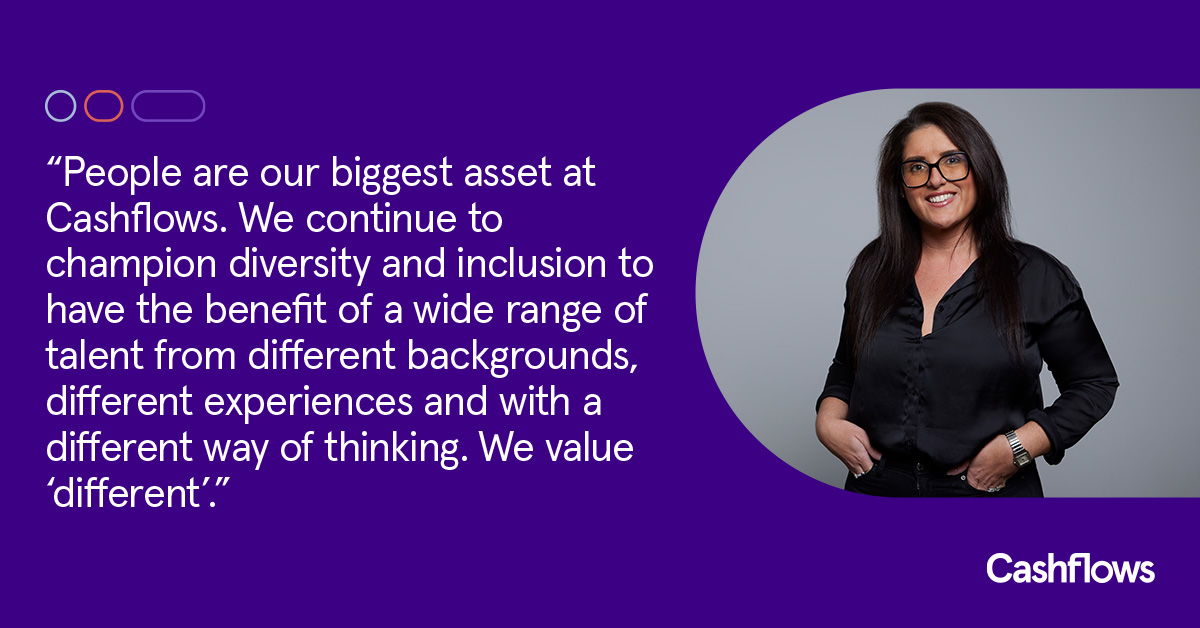In celebration of Pride Month, we interviewed our Chief People Officer, June Ahi, to understand more about diversity, equity, and inclusion (DEI), the work she does across Cashflows, and how she ensures DEI is inherent in our culture.
What are the most important issues facing current diversity, equity, and inclusion (DEI) initiatives?
Companies showing commitment to diversifying teams. It's important to actively collect diversity data to be able to drive change and champion outcomes of change.
At Cashflows, we led a recruitment drive to bring more women into STEM roles at Cashflows and, as a result, several branches within Cashflows’ tech operations (including risk, settlement, compliance, and QA testing) now consist of 50% or more women within respective teams, compared to the industry average of 18%.
Companies need to ensure they are consistently committed to DEI, and having yearly sessions can help with this. For LGBQT+ History Month, we unveiled Cashflows’ new Equality, Diversity, and Inclusion Policy. The policy perpetuates Cashflows’ open and welcoming culture and helps the company to challenge hidden bias and ensure true equality. As per the new policy, all Cashflows team members now attend DEI training on at least an annual basis.
Companies should prioritise ways of making sure all employees feel a sense of belonging and recognition – celebrating differences and inviting employees to take part. For example, celebrating Pride Month or significant calendar events such as Black History Month and International Women's Day. Having a sense of belonging can increase performance by 56%.
Finally, neurodiversity. A particular part of diversity I’m passionate about. Between 15-20% of the UK population are neurodivergent, yet just 22% of autistic people are employed. Research shows that conditions such as autism and dyslexia can bestow special skills in pattern recognition, memory, or mathematics. These are key skills in roles that sit within our industry! I tell my kids it’s their superpower that they see things and think in a different way, which is an asset to any business. Cashflows know that, and we embrace our differences.
As part of Neurodiversity Week, we hosted a Lunch & Learn and had the pleasure of hosting Elisabeth Goodman from River Rhee Consulting, who provided an introduction and discussed the importance of raising awareness to support those who are neurodivergent. What was so empowering was people opening up about their own experiences being neurodivergent and those with family members who are. It was truly inspiring to see how comfortable people felt about opening up.
Why is DEI so important to business and company culture?
People are our biggest asset at Cashflows. We continue to champion diversity and inclusion to have the benefit of a wide range of talent from different backgrounds, different experiences, and different ways of thinking. We value ‘different’. This makes Cashflows a truly unique place to work where stigmas are broken down, and diversity is embraced and part of our DNA. A diverse and inclusive organisation gives itself a greater chance of gaining access to a larger talent pool and ensures it can hire employees with the skills, experience, and knowledge needed to build high-performance teams. Employee performance in diverse organisations is 12% higher than in companies with no inclusivity efforts.
What is the significance and value of recognising and participating in events such as Pride?
Celebrating Pride in the workplace is a great way to raise awareness and equality within Cashflows, increasing understanding of the issues faced by those in the LGBTQ+ community. Pride can motivate people to strive for success and act with compassion because it forces us to consider others' viewpoints and opinions as well as our own. As part of LGBTQ+ month last year, we encouraged people to share their own stories of being part of the LGBTQ+ community to raise awareness of the importance of a diverse workforce and the benefits this brings and to break down stigma and stereotypes.
Growing up with my brother and his own journey of coming out, he was fortunate to have the love and support of family and friends. However, this is not the case for all that are going through that journey, and so it's so important that we all break the stigma and embrace people for who they are. This is why it was so important with my children. They know who their uncle is, and we “normalise” that he has a boyfriend, not a girlfriend. We wanted to demonstrate to them that this isn't a “taboo” this is just people and specifically their uncle being their true self, something we should all feel safe to be.
It is difficult to find reports and statistics on the LGBTQIA+ community within fintech specifically, which is a problem in itself. There is no one leading the discussion and demanding representation.
What needs to be done still at Cashflows to support DEI and what has been done so far?
76% of job seekers say a diverse inclusive workforce is essential when considering joining, so it needs to be part of our DNA. As we know, creating a diverse, inclusive, equitable workplace is an ongoing process that involves both investment from senior leadership and an ongoing commitment from everyone within Cashflows.
There’s no silver bullet for creating a diverse and inclusive working environment, so it’s vital to understand the common steps and requirements that go into this. Actions speak louder than words, after all.
We are already way into our journey of achieving this and have implemented many initiatives, processes, and practices. However, we know this is only possible if leadership identifies that everyone within Cashflows needs to be successful.
Diversity, equity, inclusion, and belonging is a strategic priority, which we have as part of our people strategy. We need to ensure everyone is bought into this, not just being listed on a strategy deck, but everyone sees the importance and value it brings, ensuring that we want to be the change we want to see in this industry.
We’re incredibly proud to be a business where 48% of our colleagues are women, and three out of seven of our executive team are women, promoting inclusivity at every level. We also prioritise collaborating with charities that are working towards a more inclusive and diverse workforce in the fintech and payments industry. We work closely with Women in Payments and have also previously helped TechSheCan with their role model initiative by encouraging young women in the company to get involved and be a part of the diversification of payments.
Things we continually promote at Cashflows.
- Collect data quarterly.
- Diversity & Inclusion Policy.
- Mandatory Diversity & Inclusion Training.
- Regular lunch & learns to raise awareness around this topic and celebrate the differences within us (LGBQT+, Neurodiversity, Mental health)
- Gather employee feedback regularly through employee surveys.
- Pay equity reviews.
- Make sure benefits and programs are inclusive.
Our statistics at Cashflows
Nationality & Ethnicity
- 21 different nationalities & 11 different Ethnicities indicating diversity within the workforce bringing different ideas, perspectives, and experiences to the business.
- 34% of new hires YTD are of an ethnic minority.
Age
- Good distribution across all age groups which brings in a different perspective to the group ranging from 18–60+. Main employees are aged between 25–49.
What are you most proud of having done in your career to promote DEI?
I’m proud of building DEI into the culture of a business. I refer not to monitoring stats, mandatory training, or even the policy setting; I refer to day-to-day life. It is key to create an environment where people feel they can be open to express themselves, be curious, ask questions, positively challenge and not be afraid to fail. These are the vital components to inclusion, people feeling part of the business, continually learning, and growing within their careers.
For example, when I review a company’s values, I always ensure this is not a leadership decision. This must come from all of us within the business. I like to set up cross-functional focus groups for people to share their own values and the values they want a company to live by. What you see across the focus groups are similar themes that then help build the company values, coming from the people that drive the success. This builds instant buy-in and investment from employees to really strive for success and achieve their key objectives.
This is the same approach that was taken at Cashflows when we reviewed our values last year. The 3 Cs (Courage, Clarity, and Collaboration) have inclusion at their heart, working collaboratively across functions to bring your skills & expertise to a project. Whether it’s engineering or marketing, it’s about using our talents to drive success. We want everyone to positively challenge, be curious, and not be afraid to fail.
People in all roles in the business need to know the impact their role has on the bigger picture, the company strategy. We ensure we do this by regularly updating people on the company's priorities through monthly Townhalls and assigning owners to those priorities across the business, so they see the impact they make. This is what really makes people feel included in the journey of growth, having a voice, sharing their ideas, and thus the part they play in it.
How have your previous roles/career trajectory informed how you go about shaping DEI at Cashflows?
My experiences have really made me value equity! Throughout my career within HR and leadership, leadership, specifically as a woman, I have certainly faced unconscious bias when it comes to inclusion in strategic projects and leadership opportunities. There needs to be a level playing field for all to see the value people’s expertise can bring to the table.
It is not uncommon for HR leaders to relate to being often overlooked and not part of key business decisions. Rather than being seen for the value it can bring, HR is often seen as “the fluffy stuff”.
People are the biggest asset and cost to any business and it's vital we have talented, engaged people, otherwise, productivity reduces, and attrition rates increase. Given the impact people have on delivering success for the business, we need strategic people initiatives, like talent mapping, development, and succession planning, to be discussed at the table.
This is why the role of Chief People Officer at Cashflows stood out to me, having someone in an HR role with a seat at the table. Throughout the selection process, it was so clear the value being put on investing in people, expressive culture, and the creation of a people strategy to execute on.
I’m proud to say we are executing our people strategy with individual learning journeys, a refreshed set of values created by our employees, engagement surveys, and acting on feedback and leadership development to create inspiring leadership fostering growth and empowerment.
Development in this area has to be continuous to truly have a diverse and inclusive workplace that is built from the core values of the business. The values must align with DEI to really be the makeup of the business. We want people to be their authentic selves and embrace the differences they bring to Cashflows!
I’m proud to share that in our latest engagement survey, we had a 95% completion rate, with 94% feeling their managers treat them with respect and 90% valuing the quality of work, with 88% feeling team spirit, and 94% feeling encouraged to enjoy themselves!


